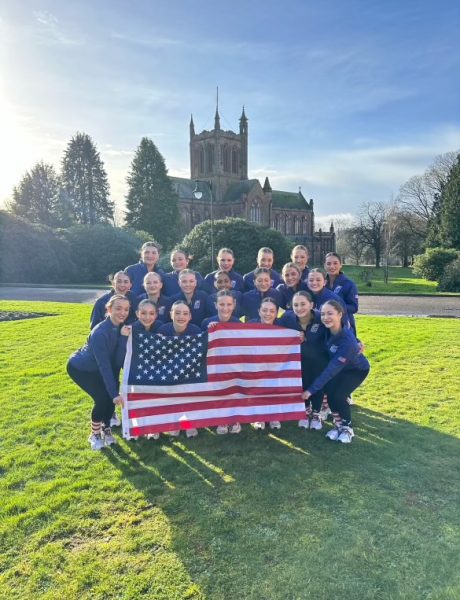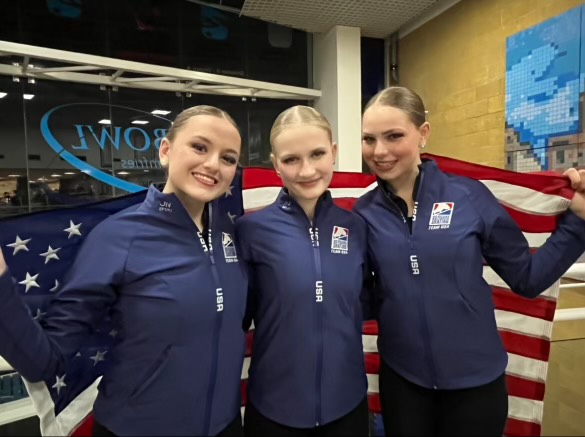At 6:00 a.m., most Shorewood High School students are still asleep, but junior Edie Dembroski’s day is well underway. At this time, Dembroski is at the Pettit Center skating. These early morning practices are part of the regimen Dembroski maintains as a Team USA figure skater competing at the international level. In January, Dembroski and her teammates competed in Scotland, and this month they are headed to Las Vegas for nationals.
Dembroski, who was born in Scotland, expressed interest in skating at a young age and began when she was four years old.
“There isn’t a lot of ice skating within the U.K., so maybe a year or two later we moved to the United States and my mom decided to sign me up then,” Dembroski said. “I was in the basic Learn to Skate program, which is recreational, and the instructor recruited me for private lessons. That’s how I got into it, and I guess it just stuck.”
Currently, Dembroski is a member of the Fond du Lac Blades organization that consists of multiple teams that compete across a range of levels or divisions.
“I’m in the junior division, which is the second highest division in figure skating,” Dembroski said. “I’m on the highest level for my organization. Junior and senior divisions are international and are the ones that are taken more seriously.”
Dembroski’s skating team went through multiple rounds of evaluation in order to qualify for the international competition. The first was a process called monitoring, where judges from U.S. Figure Skating, the governing body of figure skating in the United States, decide which teams could proceed.
“In the beginning of the season in November, my team and all the other junior and senior teams in the country [went] to Detroit for monitoring,” Dembroski said. “For 30 minutes you are evaluated by judges and they essentially decide if you’re good enough to be an international level team – just because you’re on a junior team doesn’t mean [an international is guaranteed.] They decide if you’ve got the potential.”
After monitoring, the team still needed to achieve certain scores at competitions and get the green light from U.S. Figure Skating before they officially qualified for an international competition.
“In the first two competitions of the season, Boston and California, you have to get a minimum score to determine if your team will for sure go, and if you do score that minimum score but still look bad, [U.S. Figure Skating] can say no,” Dembroski said.

Dembroski both practices with her team in Fond du Lac and takes private skating lessons at the Pettit Center to keep her skill level high.
“On the weekends and Mondays, I’m in Fond du Lac for a few hours to practice with the team as a whole, and the rest of the week I go to the Pettit Center before school,” Dembroski said. “That’s when I practice the things I need to be good at on my own for the team. I also do workouts – I work on cardio and flexibility. Additionally, once a week my team has a zoom call where we dissect videos of our practices as a tool to see our mistakes.”
Dembroski’s figure skating practices leave little time for her other responsibilities, and her schedule is often unforgiving.
“I wake up at 5:00 a.m. and get to Pettit by 6:00 a.m. – I practice at Pettit for an hour to an hour and a half depending on the day, and then I go straight to school,” Dembroski said. “I change and get ready for school in the single stall bathrooms. [After school I] go to the gym for an hour. Once I get home I have only a few hours to finish up my homework and studying and I try to be in bed by 9:00 p.m., so I can get eight hours of sleep before waking up at 5:00 a.m. the next day.”
According to Dembroski, having little free time means that she needs to be smart about doing school work whenever she has the chance.
“My biggest challenge by far is balancing school and skating – while I’m at school I use my time wisely,” Dembroski said. “Whenever we have down time or free time during class periods I’m very productive and I try to get as much done as possible because my time after school is limited. During lunch, I [also] try to spend time doing homework if I can.”
Being a member of the junior team can be demanding for skaters, from the competitive tryout process to the strict practice schedule, but what makes it worth it for Dembroski is representing the United States.
“Representing the United States as Team USA is something I’ve dreamed of since I was a little kid,” Dembroski said. “Now at the international competition when they say ‘representing the United States of America’ and call out your organization it is such a meaningful moment and I want to make those moments the best that I possibly can and that’s what makes me keep working.”

